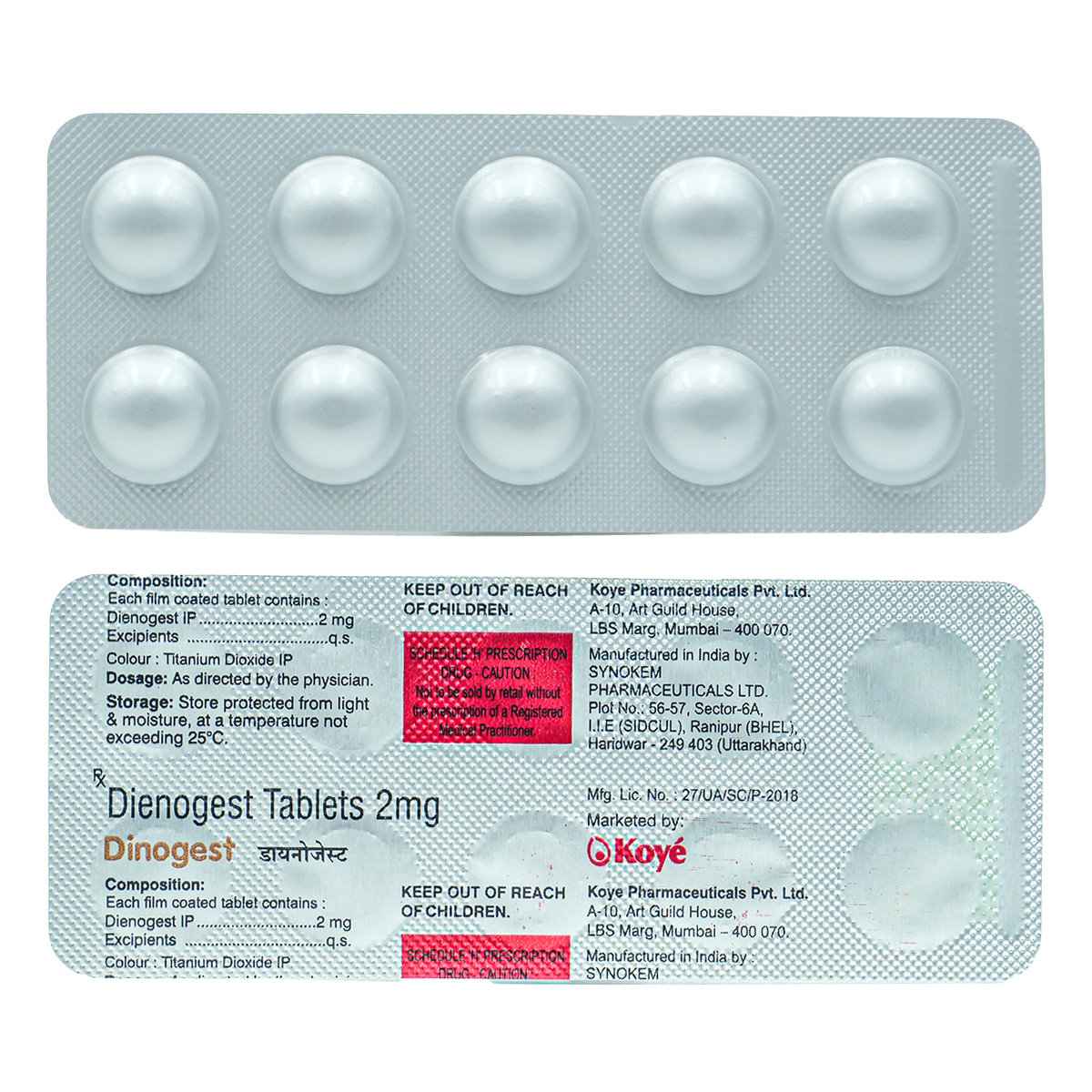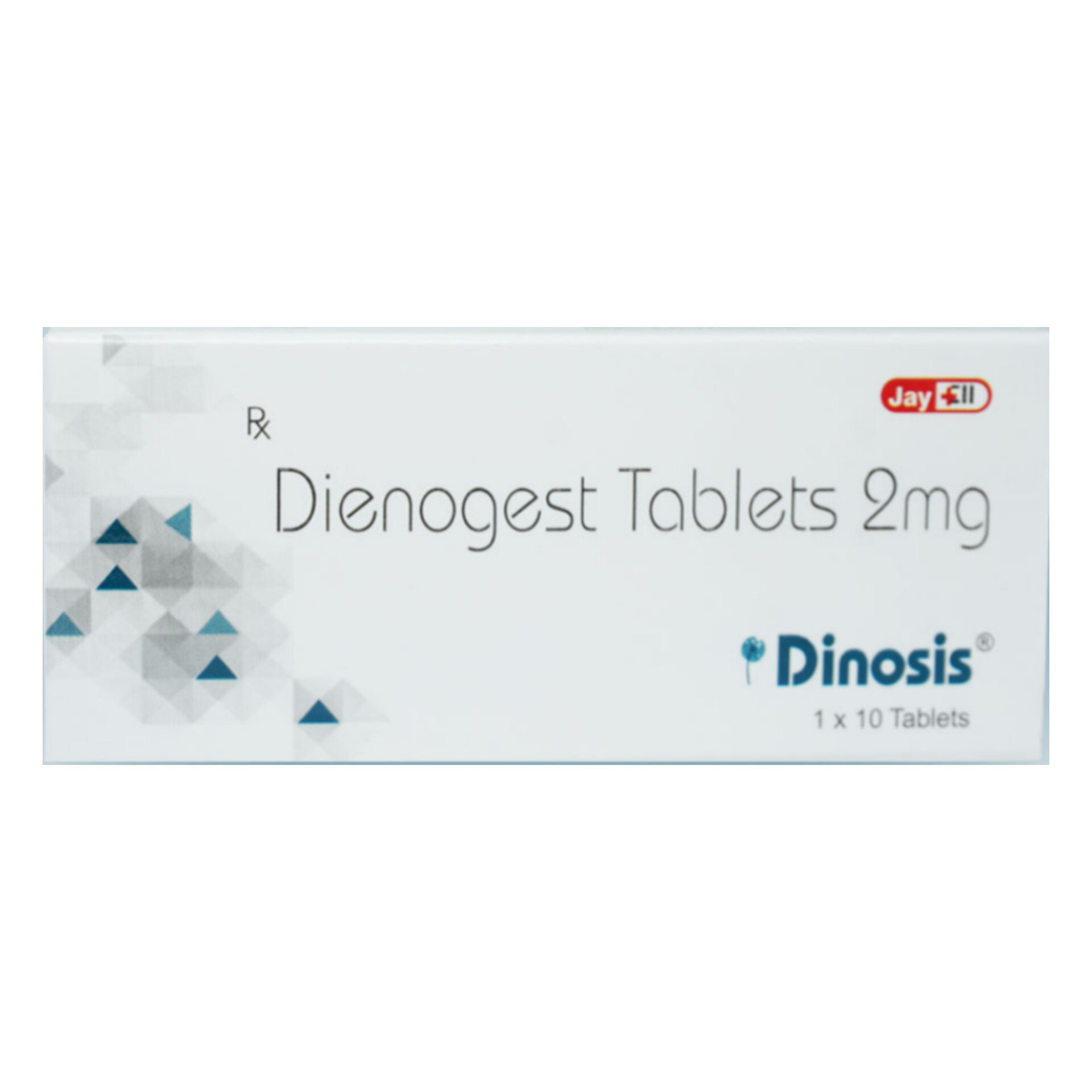Dienogest
About Dienogest
Dienogest belongs to a group of medicines called progestin indicated for the management of painful symptoms of endometriosis. Endometriosis is a painful disorder in which the tissue that generally lines the endometrium (inside the uterus) grows outside the uterus. Endometriosis generally involves ovaries, pelvis lining, and fallopian tubes.
Dienogest contains ‘Dienogest’, which suppresses the production of a hormone called estradiol which causes excess growth of the endometrium. Thereby, Dienogest helps in treating pelvic pain associated with endometriosis.
You are advised to take Dienogest for as long as your doctor has prescribed it for you depending on your medical condition. In some cases, Dienogest may cause side effects such as acne, headache, depression, breast discomfort, abdominal pain, nausea, and vomiting. Most of these side effects do not require medical attention and will resolve gradually over time. However, you are advised to talk to your doctor if you experience these side effects persistently.
Avoid taking Dienogest if you are pregnant, planning for pregnancy or breastfeeding. Consult your doctor immediately if you become pregnant while taking Dienogest. Dienogest should not be given to children who have not had their first period. Dienogest may cause dizziness, so drive with caution. Avoid or limit alcohol consumption with Dienogest as it could lead to increased dizziness. Inform your doctor about your health condition and medications to rule out any side-effects/interactions.
Uses of Dienogest
Medicinal Benefits
Dienogest belongs to a group of medicines called progestin indicated for the management of endometriosis. Dienogest suppresses the production of a hormone called estradiol which causes excess growth of the endometrium. Thereby, Dienogest helps in treating pelvic pain associated with endometriosis. Dienogest may also be used in menopausal hormonal therapy and heavy periods.
Directions for Use
Storage
Side Effects of Dienogest
- Acne
- Headache
- Depression
- Breast discomfort
- Nausea
- Vomiting
- Abdominal pain
Drug Warnings
Do not take Dienogest if you are allergic to any of its components; if you have a blood clot in the lungs, heart, brain, blood vessels of legs or any part of the body, if you have/had diabetes mellitus with damaged blood vessel, severe liver damage, unexplained vaginal bleeding, and benign or malignant tumour. Talk to your doctor if you have diabetes, high blood pressure, depression, are overweight, have chloasma (yellowish-brown pigmentation on the skin), had an ectopic pregnancy (embryo develops outside the womb), or if you or anyone in your immediate family has had blood clots in lungs/legs, or heart attack, high cholesterol or stroke. Avoid taking Dienogest if you are pregnant, planning for pregnancy or breastfeeding. Consult your doctor immediately if you become pregnant while taking Dienogest. Dienogest should not be given to children who have not had their first period. Dienogest may cause dizziness, so drive with caution.
Drug Interactions
Drug-Drug Interactions: Dienogest may interact with anti-epileptics (phenytoin, primidone, carbamazepine, oxcarbazepine, topiramate, felbamate, phenobarbitone), anti-depressants (fluoxetine, fluvoxamine), anti-hypertensive (diltiazem, verapamil), anti-TB (rifampicin, rifabutin), anti-fungal (ketoconazole, itraconazole, fluconazole, voriconazole), antibiotics (erythromycin, clarithromycin), antacid (cimetidine), and herbal supplement used to treat depression (St. John’s wort).
Drug-Food Interactions: Avoid consumption of grapefruit while taking Dienogest.
Drug-Disease Interactions: Inform your doctor if you have diabetes mellitus with damaged blood vessels, severe liver damage, unexplained vaginal bleeding, benign or malignant tumour.
Drug-Drug Interactions Checker List:
Safety Advice

Alcohol
cautionIt is unknown if Dienogest interacts with alcohol. Please consult your doctor.

Pregnancy
unsafeDienogest is not recommended during pregnancy. Please consult your doctor if you have any concerns regarding this. Consult your doctor immediately if you become pregnant while taking Dienogest.

Breast Feeding
unsafeAvoid taking Dienogest if you are breastfeeding. Please consult your doctor if you have any concerns regarding this.

Driving
cautionDienogest may cause dizziness. Do not drive or operate machinery unless you are alert.

Liver
cautionDose adjustment may be necessary. Dienogest should not be taken by people with severe liver disease. Please consult your doctor if you have a liver impairment or any concerns regarding this.

Kidney
cautionDose adjustment may be necessary. Please consult your doctor if you have kidney impairment or any concerns regarding this.

Children
cautionDienogest should not be given to children who have not had their first period.
Habit Forming
Diet & Lifestyle Advise
- Include diet-fibrous foods, iron-rich foods, foods rich in essential fatty acids, and anti-oxidant rich food.
- Maintain a healthy diet and exercise regularly.
- Practice meditation and yoga. Acupuncture and massages can also be helpful.
- Avoid or limit caffeine intake.
Special Advise
- Dienogest might affect blood tests, inform the person doing the tests that you are taking Dienogest.
- If you are undergoing any surgery, inform the surgeon and anaesthetist that you are taking Dienogest.
Patients Concern
Disease/Condition Glossary
Endometriosis: Endometriosis is a painful disorder in which the tissue that generally lines the endometrium (inside the uterus) grows outside the uterus. Endometriosis generally occurs when the endometrial tissue grows on the ovaries, pelvis lining, and fallopian tubes. Symptoms include pelvic pain, painful periods, pain in the abdomen during and before menstruation, heavy menstrual bleeding, discomfort during bowel movements, lower back pain during menstruation, pain during sexual intercourse, and cramps 1-2 weeks around menstruation.
FAQs
Dienogest suppresses the production of a hormone called estradiol which causes excess growth of the endometrium. Thereby, Dienogest helps in treating pelvic pain associated with endometriosis.
Dienogest may cause weight gain. Maintain a healthy weight by exercising regularly. Try eating smaller but more frequent meals. Consult your doctor if you notice severe weight gain.
Do not stop taking Dienogest on your own. Continue taking Dienogest for as long as your doctor has prescribed it for you depending on your condition. Do not be reluctant to speak with your doctor if you experience any difficulty while taking Dienogest.
Avoid using hormonal contraceptives with Dienogest; instead, use non-hormonal contraceptive methods such as condoms or barrier methods. Please consult your doctor; he/she may advise regarding proper contraception.
Antibiotics and antifungal medicines might affect how Dienogest works or might be affected by Dienogest. Therefore, consult your doctor before taking antibiotics or antifungals with Dienogest.
Dienogest may cause irregular menstrual bleeding or infrequent periods. Talk to your doctor if you experience this.








